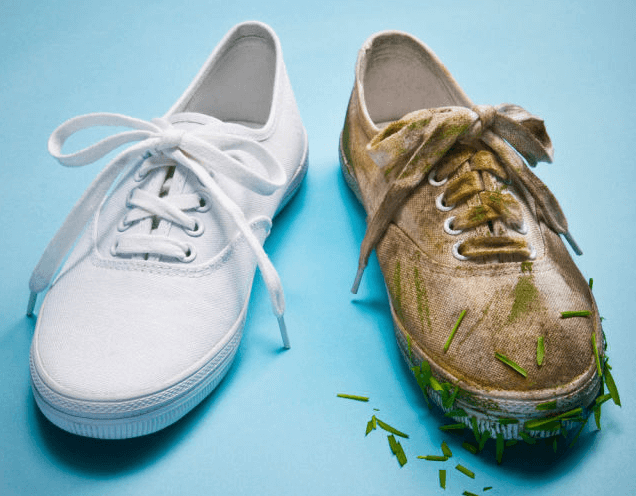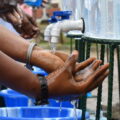Cleanliness is defined as more than removal of dirt and is a relational concept encompassing the distinctive ideas of display, disinfection, and deodorization. Cleanliness is both the abstract state of being clean and free from germs, dirt, trash, or waste, and the habit of achieving and maintaining that state. Cleanliness is often achieved through cleaning. Measures of cleanliness have to do with things in common with our human experiences. For example:
Cleanliness is generally observed, not measured (by ourselves and our customers). This means that cleanliness is not established by the process of cleaning. It didn’t matter how hard or long you rubbed those chrome bumpers, the street rod didn’t shine until the guys on the street said it shined.
Cleanliness is established by whether or not we can do what we want to do next (e.g. have our customers buy and use our product). This means that downstream success or failure defines cleanliness. My desk may look neat and clean, but if I need cash and can’t find my checkbook on my desk, the desk is not neat and clean.
Cleanliness is the result of an opinion. This means that cleanliness is subjective. You and the customer may have different opinions about the cleanliness of the same parts. In the marketplace, only the customer’s opinion counts; yours doesn’t.
What are the importance of cleanliness?
Cleanliness is next to Godliness. We’ve heard this phrase many times. But do we follow this? A lot of people don’t, even though we should. However, some of us don’t even respect the people who clean the trash. Moses gave the Israelites detailed laws governing personal cleanliness. He also related cleanliness to health and religious purification. Biblical accounts suggest that the Israelites knew that mixing ashes and oil produced a kind of hair gel. 1500 BC – Records show that ancient Egyptians bathed regularly. However, the link between cleanliness and health was first made less than two centuries ago. Here are 8 important points about cleanliness and its benefits;
Prevents Disease
Dirt and grime promote the spread of germs, which can also encourage the spread of communicable diseases. A clean environment is crucial to ensure that people don’t get sick. If sickness spreads throughout an entire community, it can have devastating consequences. The sickness can be passed not just to an individual, but also to other members of the family. It is important to make sure that key areas of our house and surroundings are clean at all times, especially where germs tend to be. This includes high traffic places like kitchen , locker rooms, and all restrooms.
Cleanliness saves lives.
Inadequate sanitation and hygiene are responsible for a huge amount of preventable deaths – in fact it’s believed that adequate hygiene could save around 8 million lives around the world. Good hygiene practices can reduce the risk of contracting gastrointestinal and respiratory infections, including influenza and salmonella.
Cleanliness reduce sick days and lost productivity.
Cleanliness also has a significant benefit towards business productivity. One German study found that using hand sanitizer significantly cut down the number of sick days that employees took off from work because of colds, coughs, fevers or diarrhea. That means having hand sanitizer dispensers and a personal hygiene checklist in your workplace is a very good idea.
Cleanliness can help fight against antibiotic resistance.
The World Health Organization has stressed the role of hand hygiene in managing antibiotic resistance and the development of ‘super bugs’. It’s believed that at any given time, 7-10% of patients undergoing treatment will acquire at least one health care-associated infection. If medical and care staff can perform best practice hand hygiene then they can drastically cut these infections and the resulting dependence on antibiotics.
Cleanliness makes you a great role model.
In daily life, the Japanese practice cleanliness regardless of their location. Children usually volunteer to pick up trash from the streets near their schools on a monthly basis. Neighborhoods also have street-cleaning events, bringing residents together to gather trash. This has set Japan out as a nation of clean people, it’s important that we pass on effective hygiene practices to the next generation. Be sure to teach kids in your life the value of washing their hands regularly and after going to the bathroom. We have some fun classroom activities that can help with this.
Cleanliness makes you more attractive to other people.
It’s no secret that good hygiene will help our social standing. After all, meeting someone with clean clothes and scrubbed fingernails will be much more pleasant than meeting someone with grubby hands and clothes. Research has indicated that clean and bright teeth make you more attractive to the opposite sex, and we’re guessing the same goes for general hygiene too.
It can boost academic performance
Academic success also depends on the school environment. Many people can work in clutter and filth but most prefer a workspace that is organized and free from dirt and debris. A recent study highlighted that there was a relationship between cleaning and learning. In fact, 88% of students reported that they became distracted when they were in a moderately cluttered environment. These were not extreme examples of filth but simple things like dirt building up in corners and smudge marks on surfaces.
It Keeps Everyone Safe
Although we’ve covered the importance of cleanliness in many different ways, the final point to make is that this is everyone’s responsibility. Good hygienic practices start at a young age. Regardless of your environment, age, or position, it’s never too late to start working on this area. When we all pay attention to this, we promote good health and overall wellness in our own lives as well as the community so make sure that you do your part.
SEE: How to Wash Your Hands Properly?






